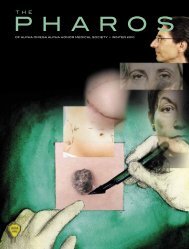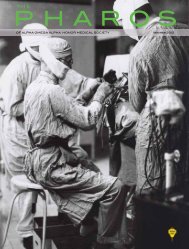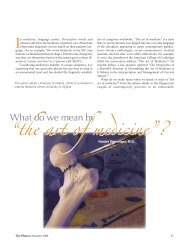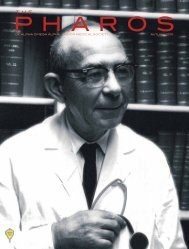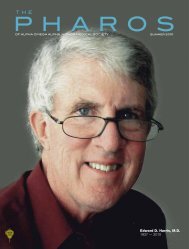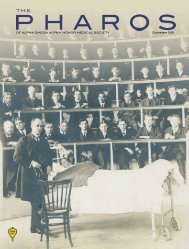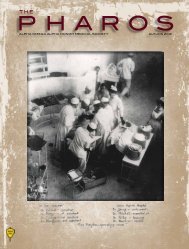4 - Alpha Omega Alpha
4 - Alpha Omega Alpha
4 - Alpha Omega Alpha
You also want an ePaper? Increase the reach of your titles
YUMPU automatically turns print PDFs into web optimized ePapers that Google loves.
learning on, not learning from. What<br />
could they know? I was wrong. Who<br />
understands a disease better than the<br />
patient?<br />
A first patient. A dying patient.<br />
With generosity and tolerance, he answered<br />
the many questions medical<br />
students were required to ask. When I<br />
put my cold stethoscope on his chest,<br />
he smiled and murmured, “Doc, you<br />
may want to warm that up next time.”<br />
The first of the lessons he taught me.<br />
He led my hand to the hard nodes<br />
above his clavicle, guided me to his<br />
swollen liver, and demonstrated the<br />
weakness in his left hand.<br />
It is easy to remember the details of<br />
that first patient. But after moving to<br />
cardiac surgery for twenty-nine years,<br />
then dropping out of medicine for ten<br />
years to climb mountains, and finally<br />
returning to Stanford in 1995 to study<br />
humanities and staying to teach medical<br />
humanities, I recalled little of general<br />
medicine.<br />
It seemed like a full life. I did not<br />
miss the operating room but missed<br />
the patient contact, the real doctoring<br />
that connected with my teaching—<br />
the literature that embraces illness.<br />
This year when a clinic opened for the<br />
low-income and minimally insured<br />
population of our town, I volunteered<br />
to help the two family doctors who<br />
took time from their busy private practices<br />
to work there. It was a tsunami of<br />
surprises, worse than I expected. I was<br />
as lost and confused as King Lear in<br />
the forest. I knew little of modern general<br />
practice. Fortunately the two doctors<br />
in our clinic were willing to teach.<br />
The first patient I saw was a man in<br />
his late seventies who was in the clinic<br />
for a routine visit and to renew his<br />
prescriptions. He was complicated. Not<br />
the single problem of a stenosed aortic<br />
valve or blocked coronary arteries I had<br />
encountered as a surgeon. Back pain,<br />
high blood pressure, asthma, elevated<br />
cholesterol. And then I noticed he was<br />
sitting in a wheelchair. “My leg, Doctor,<br />
I had polio.” I had not seen a patient<br />
with polio in fifty years. He explained,<br />
“Just missed the vaccine.”<br />
My first medical patient in twentytwo<br />
years had more diseases than I<br />
could imagine. I retreated humbly to<br />
the conference room and consulted the<br />
family doctor working that day. “How<br />
do you deal with so many diseases<br />
in one patient? How can you know<br />
enough? In my first go-around as a<br />
student we had few medications for<br />
high blood pressure, high cholesterol,<br />
asthma.” He smiled and suggested I take<br />
my time, go over each problem, then<br />
ask what was really bothering him. My<br />
patient sat quietly in his wheelchair, did<br />
not complain at my tardiness, allowed<br />
me to ask the dozens of questions he<br />
had answered many times. His blood<br />
pressure was slightly elevated, but his<br />
lungs were clear. He remarked, “Another<br />
cold stethoscope.” I was embarrassed.<br />
Twice in one medical life. I reassured<br />
him that his problems were well controlled.<br />
His last question was a surprise.<br />
“Doctor, could I have—I would appreciate<br />
some samples of Viagra. Might I<br />
have a few tablets?” Another shock. In<br />
my era not only did few doctors talk<br />
about sexuality, but rarely did a patient<br />
bring up the subject. My first patient,<br />
once again: enlightenment. That has<br />
not changed. Given the opportunity and<br />
the time most patients will reveal their<br />
complexity, their charm, and will teach<br />
us. He deserved samples of Viagra.<br />
The author’s address is:<br />
433 Bridgeway<br />
Sausalito, California 94965<br />
E-mail: larryz.zaroff@gmail.com<br />
The Pharos/Spring 2009 31



